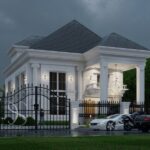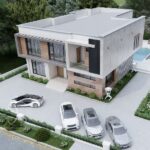As Nigeria’s urban centers expand and the demand for housing grows, there’s an increasing need for homes that are not only comfortable and aesthetically pleasing but also environmentally friendly and technologically advanced. Smart home features and sustainable designs represent the convergence of modern technology and eco-conscious living, offering solutions that cater to the evolving needs of Nigerian homeowners.
Understanding Smart Homes
What is a Smart Home?
A smart home integrates advanced technologies to automate and control household systems such as lighting, security, heating, and appliances. These systems can be managed remotely via smartphones or computers, providing convenience, efficiency, and enhanced security.
Benefits of Smart Homes in Nigeria
- Energy Efficiency: Smart thermostats and lighting systems optimize energy usage, reducing electricity bills—a significant advantage given Nigeria’s energy challenges.
- Enhanced Security: Smart security systems, including surveillance cameras and motion detectors, offer real-time monitoring and alerts, improving home safety.
- Convenience: Automation of routine tasks, such as adjusting lighting or controlling appliances, enhances daily living experiences.
Embracing Sustainable Architecture
Principles of Sustainable Design
Sustainable architecture focuses on minimizing environmental impact through:
- Use of Local Materials: Incorporating locally sourced materials reduces transportation emissions and supports local economies.
- Energy Efficiency: Designs that maximize natural light and ventilation reduce reliance on artificial lighting and air conditioning.
- Water Conservation: Implementing rainwater harvesting and water-efficient fixtures conserves water resources.
Tropical Modernism in Nigeria
Tropical Modernism is an architectural style that blends modern design with traditional tropical elements. In Nigeria, this approach is characterized by:
- Natural Ventilation: Designs that promote airflow reduce the need for mechanical cooling.
- Shading Devices: Use of overhangs and louvers to protect interiors from direct sunlight.
- Indoor-Outdoor Living: Creating seamless transitions between indoor spaces and the natural environment.
Integrating Smart and Sustainable Features
Solar Energy Utilization
Harnessing solar power addresses Nigeria’s inconsistent electricity supply. Solar panels provide a renewable energy source, reducing dependence on the grid and lowering energy costs.
Smart Water Management
Implementing smart irrigation systems and water leak detectors ensures efficient water use, conserving this vital resource.
Energy-Efficient Appliances
Using appliances with high energy efficiency ratings minimizes electricity consumption, contributing to sustainability goals.
Case Studies: Smart & Sustainable Homes in Nigeria
The Ngarannam Community Project
Architect Tosin Oshinowo, in collaboration with the United Nations Development Programme, developed a community for displaced persons in Ngarannam, Borno State. The project features over 500 homes designed with local materials and sustainable practices, including natural ventilation and solar energy utilization.
Alára Concept Store and Residence
Fashion entrepreneur Reni Folawiyo’s Alára store and her Lagos penthouse exemplify the fusion of smart design and sustainability. Designed by architect David Adjaye, these spaces incorporate natural materials, energy-efficient systems, and smart technologies to create luxurious yet eco-friendly environments.
Challenges and Opportunities
Challenges
- High Initial Costs: The upfront investment for smart technologies and sustainable materials can be substantial.
- Limited Awareness: Many homeowners and developers may lack knowledge about the benefits and implementation of smart and sustainable features.
- Infrastructure Limitations: Inconsistent internet connectivity and power supply can hinder the effectiveness of smart systems.
Opportunities
- Government Incentives: Policies promoting renewable energy and sustainable building practices can encourage adoption.
- Technological Advancements: Innovations are making smart home technologies more affordable and accessible.
- Environmental Impact: Reducing carbon footprints aligns with global sustainability goals and can attract eco-conscious buyers.
Conclusion
The integration of smart technologies and sustainable design in Nigerian homes offers a pathway to more efficient, comfortable, and environmentally responsible living. While challenges exist, the long-term benefits for homeowners, the environment, and the economy are substantial. Embracing smart and sustainable homes is not just a trend but a necessary evolution in Nigeria’s housing sector.





